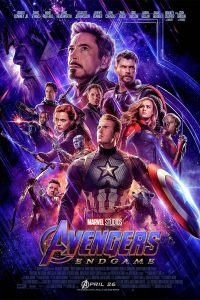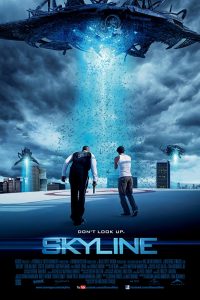What to Expect When You’re Expecting a Chestburster: Arley Sorg and Josh Pearce Discuss Alien: Romulus
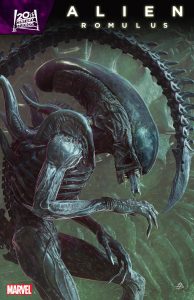 As Alien: Romulus opens on a stunning starscape and clever title sequence, the Weyland-Yutani corporation is up to its usual tricks, recovering something foreboding from deep space and whisking it away for further study/experimentation.
As Alien: Romulus opens on a stunning starscape and clever title sequence, the Weyland-Yutani corporation is up to its usual tricks, recovering something foreboding from deep space and whisking it away for further study/experimentation.
Sometime later, a mix of six friends and family conspire to escape the dismal conditions of a company-controlled mining colony. Unable to break their employment contracts with Weyland-Yutani, and facing deadly work environments, they hatch a plan to fly an ore hauler up to what they think is a derelict spaceship. There they’ll steal its cryostasis chambers, which will enable them to make the multi-year interstellar voyage to a new life on a new world.
Instead of a spaceship, though, they find a dormant science research station. The ragtag crew restores its power and starts flipping switches and pushing buttons, awakening the systems and creatures within. Thus follows a series of unfortunate events.
Josh: I don’t think I was even halfway through watching this, and I thought, “This is almost exactly my type of movie.” It was really cool space scenes and good spaceship science fiction, and then straight into body horror.
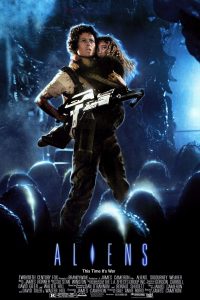 Arley: I didn’t like it as much as you did. I think the best executed stuff for me was really the setting and the effects. Those elements were all interesting. And I appreciated the retro-futuristic-industrial vibe. They put a lot of effort into capturing the sort of grungy feeling of Alien and Aliens, which is very different from the Prometheus and Covenant vibe. Down to the computer screen readouts! This was also far more convincing than Alien 3 and Resurrection. Romulus looks like a sci fi movie that was made 20 years ago, with all the buttons and switches kind of technology that even now feels antiquated.
Arley: I didn’t like it as much as you did. I think the best executed stuff for me was really the setting and the effects. Those elements were all interesting. And I appreciated the retro-futuristic-industrial vibe. They put a lot of effort into capturing the sort of grungy feeling of Alien and Aliens, which is very different from the Prometheus and Covenant vibe. Down to the computer screen readouts! This was also far more convincing than Alien 3 and Resurrection. Romulus looks like a sci fi movie that was made 20 years ago, with all the buttons and switches kind of technology that even now feels antiquated.
Josh: It’s ruggedized, which makes sense when you’re in space, in a hostile environment. It looks antiquated, but really it’s practical.
Arley: Prometheus and Alien: Covenant are about rich dudes with sleek technology. This is a labor colony so in a way it makes sense that these technologies are the cheapest possible, barely utilitarian things that Weyland is using to mine resources. Romulus continues the underlying “disposability of humans” theme that runs through a lot of the Alien movies, asking the timeless question: are humans the real monsters? At least, some humans. Which is a theme I always appreciate. But, for me, the story itself was not that great.
Josh: Well, it’s a very basic Alien story, right?
Alien: Romulus is set between the events of Alien and Aliens, making it a semi-sequel, semi-prequel, and partial reboot, kind of an Alien 1.5. (For first timers, we don’t recommend watching these three movies in that chronological order because most of the material in Alien: Romulus works best when you have a working knowledge of Aliens.) The film is filled with references to nearly all of the franchise’s other entries, to the point where direct quotes and shot-for-shot recreations are wedged in as obvious fan service.
 But even beyond specific scenes, the broad strokes of the plot are instantly recognizable—there will be facehuggers, chestbursters, and at least one full-grown Xenomorph, with all the associated gruesome deaths. The characters’ motivation quickly boils down to Run! Get to the ship! and some sort of self-destruct to cleanse the infected area appears inevitable. Even after a seemingly successful escape, safety is not guaranteed.
But even beyond specific scenes, the broad strokes of the plot are instantly recognizable—there will be facehuggers, chestbursters, and at least one full-grown Xenomorph, with all the associated gruesome deaths. The characters’ motivation quickly boils down to Run! Get to the ship! and some sort of self-destruct to cleanse the infected area appears inevitable. Even after a seemingly successful escape, safety is not guaranteed.
Josh: This is like a greatest hits compilation of the entire franchise. They even pulled stuff from Raised by Wolves. That’s not technically the Alien Universe, but it’s produced by Ridley Scott, and the androids behave the same way and have the same white blood. And the Father android in that was always telling dad jokes, just like Andy was doing in this.
Arley: I do think it’s one of the better entries in the series, and I say that having just rewatched everything except AVP: Requiem. I tried and… turned it off, about an hour in, asking myself if I was making good life choices. I think the smartest thing that the second movie did was to be an action movie and not try to be space horror again like the first one. It set out to do something completely different. This one, for me, is trying so hard, at least in the first half, to be space horror, to recapture that original Alien vibe. I think the action sequences later on are more successful.
Josh: Yeah it was definitely shifting tones throughout, so you can kind of view it as three different movies in a trenchcoat. But they took each of those familiar scenes and did something on top of them. Like when they were shooting all the aliens with the machine gun and then had to dodge the floating acid. It incorporated the antigravity into the actual problem solving. That was a very video game thing to do, kind of like Dead Space. So there were a lot of times where I was thinking, “Oh, I know what’s coming,” but also, “Ooh, how are they going to do what I know is coming?” That was a lot of fun.
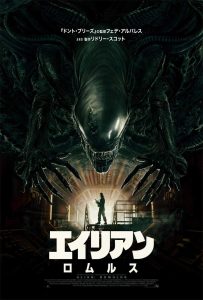 Although not all of the characters are fully fleshed out, they are readily sympathetic simply by virtue of trying to scrape a living out of a shitty job. Without having to be scientists or military (one character claims to get weapons training from magazines and videos), they do clever things in life-threatening situations. Each was, in their own way, making what they thought were the best decisions for themselves. They never fell into the slasher-horror trap of making stupid choices just to move the plot along.
Although not all of the characters are fully fleshed out, they are readily sympathetic simply by virtue of trying to scrape a living out of a shitty job. Without having to be scientists or military (one character claims to get weapons training from magazines and videos), they do clever things in life-threatening situations. Each was, in their own way, making what they thought were the best decisions for themselves. They never fell into the slasher-horror trap of making stupid choices just to move the plot along.
The relationship between Rain Carradine (Cailee Spaeny) and her adopted artificial brother Andy (David Jonsson) forms the emotional core, with an entire tragedy’s worth of betrayal, abandonment, and sacrifice slotted in between the many run-and-gun (or don’t-move-don’t-breathe) sequences.
Jonsson’s wide-ranging performance as a reprogrammable synthetic person is easily the best of the entire movie, and from one angle he appears to be the main character (he’s certainly the one largely driving the plot). But, of course, this is an Alien movie, and every Alien movie needs its Ripley character, and Rain is that Ripley character, down to the wardrobe changes.
Josh: Why? Why is every main character or protagonist in these movies the same kind of character? We’ve seen this slim, brunette, white woman doing it for seven movies now—like, try something new?
Arley: Why does she always have to end up running around in her underwear? Especially when the guys don’t necessarily end up in their underwear. I think that there were various social issues embedded in the film, things that are not unusual for American films. But they come from narrative decisions that didn’t have to be made in the ways they were made. I’ll skip the rant but some of those things will rub a lot of people the wrong way.
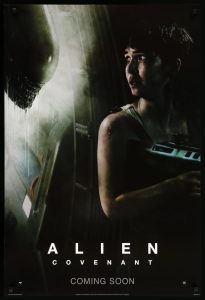 Alien and the parts of Alien: Romulus that emulate it are essentially slasher movies. Even with only six potential victims onboard, there are enough fakeouts, near-misses, and close calls to keep the danger level consistently high. But there are different kinds of fear. The original Alien utilizes atmosphere to maximize shock. In Aliens the forewarned audience, and Ripley, feel dread. Alien: Romulus attempts the dread, but we already know what’s going to happen. Fear that is expected is less effective.
Alien and the parts of Alien: Romulus that emulate it are essentially slasher movies. Even with only six potential victims onboard, there are enough fakeouts, near-misses, and close calls to keep the danger level consistently high. But there are different kinds of fear. The original Alien utilizes atmosphere to maximize shock. In Aliens the forewarned audience, and Ripley, feel dread. Alien: Romulus attempts the dread, but we already know what’s going to happen. Fear that is expected is less effective.
Arley: The trailers promised an atmospheric horror movie. For me, the horror wasn’t quite there. I went with a bunch of friends and they all had similar reactions. But some folks have told me it worked for them. I think the best, creepiest scene was when all the facehuggers are chasing them, but you already get a glimpse of that in the trailers, so it’s kinda like when a comedy plays all the best jokes in previews and the rest of the movie isn’t quite as funny. I think facehuggers tap into a common fear of spiders – the legs, the movements. Did you feel like the movie was scary?
Josh: I feel like the scary flavor was “gross out,” and I like transformative body horror movies a lot. They were going pretty hardcore into the childbirth-as-horror theme. It reminded me of the Dead Ringers remake with Rachel Weiss, which is not speculative at all but it’s flat-out body horror, and all the body horror is simply childbirth. A million things can go wrong! People die all the time in childbirth, your baby could be dead. So that kind of horror creates a very tense atmosphere. Then Alien: Romulus kept getting weirder until I was evil-cackling out loud in the theater. The breastfeeding moment was fucked up.
Arley: They did go out all out with the pregnancy stuff, but they could have done something similar with the dudes and gotten more creative with their body horror. The expressions of violence were… unbalanced, in terms of who got what. It reminded me of old discourse about violence against women in horror. Anyways, skipping the rant. A lot of the body horror and horrific imagery, to me, is a repeated refrain. If you haven’t seen the previous films it will feel newer.
Josh: Yeah, maybe because these creatures are such a familiar thing to us as an audience of a long-running franchise, the teeth have been pulled out of it.
Arley: I think that might be hitting on something. The problem is that the alien is such a known quantity that a lot of the standard tactics for dread don’t work, unless the viewer is someone who has absolutely no idea what these movies are.
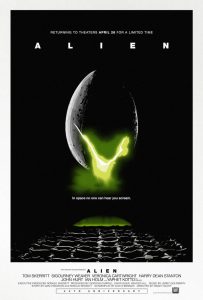 Josh: Well, that’s kind of the thing like, what’s the purpose of this movie? Is it a soft reboot introducing the Alien franchise to new viewers? Basically, this is like a “previously, on Alien” recap that catches you up so they can launch a new series of films, or to set up that TV show that’s coming out. I did feel like the writers and director know and appreciate the Alien franchise enough that they pulled in stuff that they themselves enjoyed. I feel like it’s an homage, more than just a cynical rehash.
Josh: Well, that’s kind of the thing like, what’s the purpose of this movie? Is it a soft reboot introducing the Alien franchise to new viewers? Basically, this is like a “previously, on Alien” recap that catches you up so they can launch a new series of films, or to set up that TV show that’s coming out. I did feel like the writers and director know and appreciate the Alien franchise enough that they pulled in stuff that they themselves enjoyed. I feel like it’s an homage, more than just a cynical rehash.
Arley: To be honest, that makes me rethink my entire assessment. The previews made me think Romulus would be a fresh take, and a return to the real horror roots of the original film. So: I was kind of disappointed. But if you watch it as an homage, if I think of it as an homage, then it’s actually really good.
Josh: If you enjoy monster movies, well then. It’s a monster movie! You can just take it at that face value.
Arley: Space monster action—
Josh: I enjoy all those words.
Arley: —If you just take it as a space monster action movie and just have fun with it, then I think you will enjoy a lot.
Josh: Shout out to the special effects. The aliens were almost all practical suits, and the facehuggers were robotics. Obviously, all the space stuff is CGI but it looks amazing. There are some really good exterior shots.
Arley: The effects are all really good!
Josh: Except for the CGI Ian Holm, that looked terrible. Just slap a rubber mask on a Disney animatronic and there, you’ve got your broken robot. Someone made an android Philip K. Dick after he died, they can do the same for Ian Holm.
Directed by: Fede Alvarez
Written by: Fede Alvarez & Rodo Sayagues, based on characters by Dan O’Bannon & Ronald Shusett
Starring: Cailee Spaeny, David Jonsson, Archie Renaux, Isabela Merced, Spike Fearn & Aileen Wu (with various aliens played by Robert Bobroczkyi & Trevor Newlin)

JOSH PEARCE has had more than 100 stories and poems published in top science fiction magazines, including Analog, Asimov’s, Beneath Ceaseless Skies, Bourbon Penn, Cast of Wonders, Clarkesworld, Diabolical Plots, Interzone, Nature, On Spec, Weird Horror, and elsewhere. Find more of his writing at fictionaljosh.com. One time, Ken Jennings signed his chest.
ARLEY SORG, Senior Editor, has been part of the Locus crew since 2014. Arley is an associate agent at kt literary. He is a 2022 Kate Wilhelm Solstice Award recipient and a 2023 Space Cowboy Award recipient. He is also a 2021 and 2022 World Fantasy Award finalist and a 2022, 2023, and 2024 Locus Award finalist for his work as co-Editor-in-Chief at Fantasy Magazine. Arley is a 2022 Ignyte Award finalist in two categories: for his work as a critic, and for his essay “What You Might Have Missed” in Uncanny Magazine. He is Associate Editor and reviewer at Lightspeed & Nightmare magazines, columnist for The Magazine of Fantasy and Science Fiction, and interviewer at Clarkesworld Magazine. He grew up in England, Hawaii, and Colorado, and lives in the SF Bay Area. A 2014 Odyssey Writing Workshop graduate, Arley has spoken at a range of events and taught for a number of programs, including guest critiquing for Odyssey and being the week five instructor for the six-week Clarion West workshop. He can be found at arleysorg.com – where he ran his own “casual interview” series with authors and editors – as well as Twitter (@arleysorg), Blue Sky, and Facebook.
 While you are here, please take a moment to support Locus with a one-time or recurring donation. We rely on reader donations to keep the magazine and site going, and would like to keep the site paywall free, but WE NEED YOUR FINANCIAL SUPPORT to continue quality coverage of the science fiction and fantasy field.
While you are here, please take a moment to support Locus with a one-time or recurring donation. We rely on reader donations to keep the magazine and site going, and would like to keep the site paywall free, but WE NEED YOUR FINANCIAL SUPPORT to continue quality coverage of the science fiction and fantasy field.
©Locus Magazine. Copyrighted material may not be republished without permission of LSFF.





